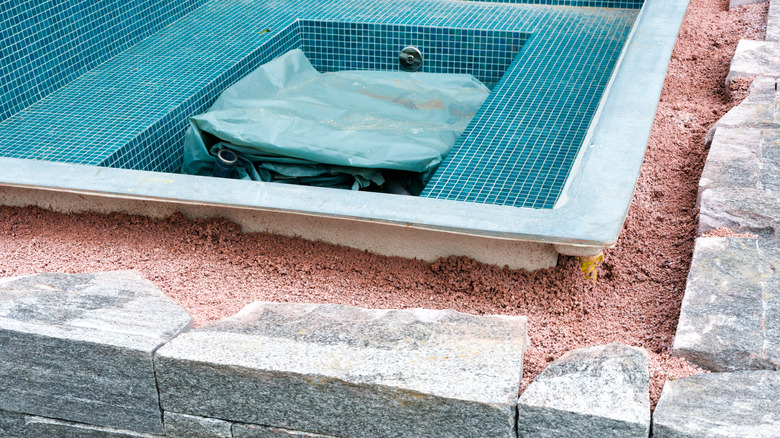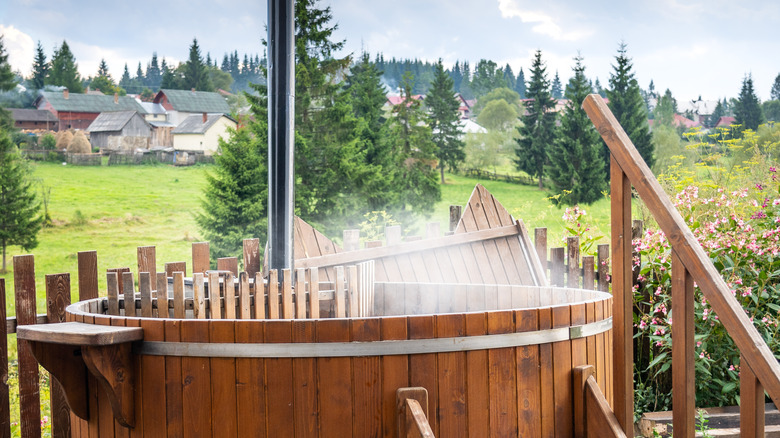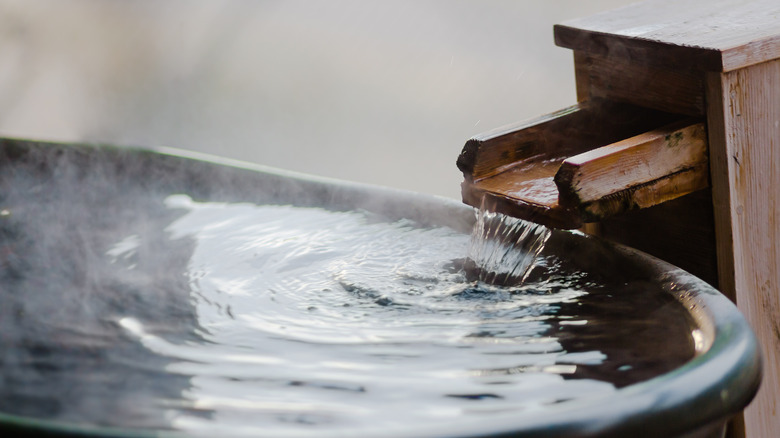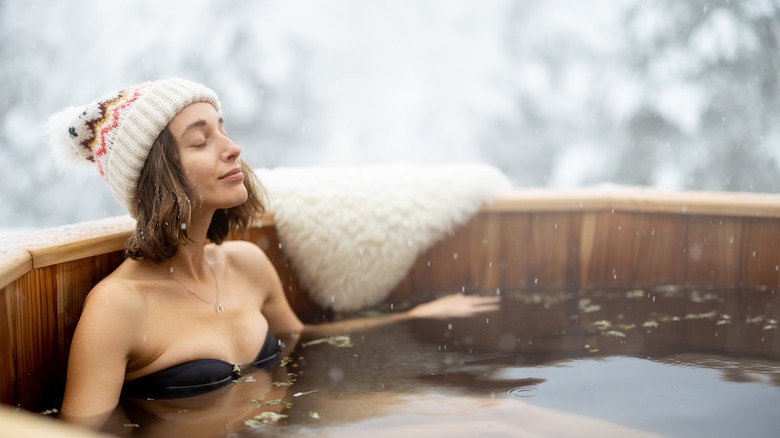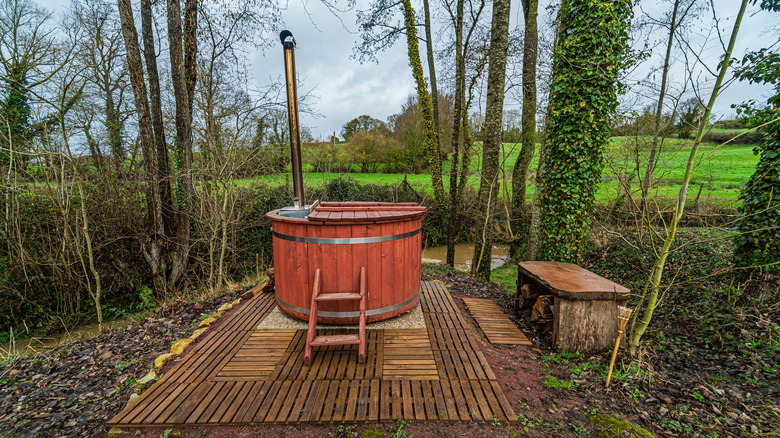How Much Does It Cost To Build A Hot Tub?
Building a hot tub is an affordable way to provide luxury and comfort without leaving your home. While many are familiar with purchased fiberglass models, homebuilt hot tubs are often made of wood, stone, or other repurposed materials. As a result, prices can range from only a few hundred dollars to costs in the thousands depending on both the complexity of the build and the requirements of the heating systems.
Most DIYers will be able to save on the cost of purchasing a hot tub itself, as finished models can run from $3,000 to $10,000, with basic installation costs running up to $500, according to HomeGuide. Costs that may or may not apply to a DIY hot tub build include the delivery price of materials, the expenses to create a base or concrete pad, permits for your build based on location, and whether or not you need to hook up your unit to a new or existing electrical supply.
Factors that affect hot tub costs
Factors that affect hot tub building costs include the amount of labor needed to finish your tub and the materials you have chosen to use in your build.
Basic hot tub building costs
Building your own hot tub will typically involve a wooden DIY kit, an in-ground tile or cement structure, or more innovative and creative DIYs such as repurposing an old water trough which will vary in cost as considerably as the material. HomeGuide shares that in-ground hot tubs typically start at $10,000 and go up from there to $25,000.
Hot tub costs by type
I can make wooden hot tubs for as little as $3,000, according to Tubtopia, but they can go up to around $10,000 each if you choose to add electric gas and other options. Inflatable hot tubs are a more temporary option with a simple setup and typically run for under $1000.
Hot tub costs by size
Bob Vila mentions that most hot tubs are sized for two to three persons, although four- to six-person sizes are also standard. A high-end four-person hot tub usually will not cost more than $8,000, and DIY kits should be priced significantly lower on average. Extra-large hot tubs such as 12-person and larger sizes easily range into the tens of thousands of dollars for both prebuilt and DIY.
Additional costs for a DIY hot tub
A hot tub can render additional costs, depending on how fancy you want to make it. For instance, electrical work will cost extra, as so will a concrete base.
Concrete base or electrical work
Larger hot tub kits or materials will typically cost between $200-$500 for delivery, upwards of $500 if you need a new concrete base, Bob Vila says, and around $800 if you need professionally added electricity to make the hot tub work. Depending on the build, you may also need to purchase a permit.
Hot tub costs by energy source
Most additional hot tub costs are based on energy. For DIY hot tub builders, the energy sources can be wood, propane, or electricity. Electric hot tub heating has the most available data on costs as both built hot tubs and manufactured hot tubs can run on electric heat. Direct Energy notes that a 120-volt heater will consume 3,000 watts while in use, which is typically around 90 minutes at a time and can be estimated at 3 kilowatt-hours for peak use. The costs will be less for basic, covered heating. Cold weather, cold climates, and tub size will increase this usage.
Additional costs
Spadepot describes an additional consideration for wood-fired hot tubs which is the need to periodically drain the water and pay utility costs to refill — a prospect that will vary with utility bills by area. Saltwater filtered hot tubs can have additional costs.
Types of DIY hot tubs
There are a few standard hot tub types, but the most common are wooden and stock tank hot tubs.
Wooden hot tubs
A highly popular type of DIY hot tub, wooden hot tubs boast the beauty of natural wood and the simplicity of a hot spring. Tubtopia shares that wooden hot tubs are prized for their versatility and affordability when compared to modern models, although these may lack added features such as jets and lighting. Wooden hot tubs can be heated by electricity, propane/gas, or wood. Additionally, you can customize the wood used in its construction with common choices, including Western red cedar, Alaskan yellow cedar, and teak. Wooden hot tubs can be managed with minimal chemicals and regular draining or standard agents such as bromine.
Plan-based hot tubs
Other standard hot tub builds include cement hot tubs or metal hot tubs, often called stock tank hot tubs. Unlike wooden builds, these DIY options don't normally come in kits. However, most items used to build them can be purchased at your local home improvement or landscape stores, as FarmStore implies. Like wooden hot tubs, these builds can be highly customized based on features, size, and cost. Additional options to build a hot tub are limited mostly by the imagination; you only need a material that can hold water and a safe heating source.
Why you need a hot tub
The largest driving factor on why you need a hot tub is because you will enjoy having it at home. That said, there are some added benefits.
Health benefits of a hot tub
Jacuzzi may have reason to boast the benefits of hydrotherapy or warm water therapy, but the data has been pretty well-documented as common knowledge. For example, Everyday Health notes that warm water soaking helps improve circulation and ease aching joints. In addition, many people notice reduced stress and improved mental health after their time spent in a hot tub.
Cost benefits of a hot tub
If you've joined a gym for regular access to a hot tub, you probably aren't alone. The cost of accessing a hot tub outside your home can add up to $44 per month at a higher-end gym, as shared by Run Repeat. Building your own hot tub can keep your costs local.
Benefits of a DIY hot tub
Having a hot tub can also increase the features and demand of your home when it comes to value.
Homeowners value a hot tub
Forbes explains that a well-built hot tub that is incorporated into your landscaping or hardscaping will traditionally add to your home value when it comes to the sale price. The hot tub should be visibly appealing and in well-working order, or it has the potential to instead detract from value. Hot tubs are also in higher demand in the right climate and demographic areas: While a hot tub may be a large bonus at a Colorado mountain a-frame, it may be seen as a detriment in a densely packed San Diego suburb.
The curb appeal of a hot tub
If you are building a hot tub for a long-term rental or vacation rental, you will almost certainly grab attention according to Summit Rentals. While homeowners may be hesitant based on costs and maintenance, renters will frequently jump at the chance to enjoy a private hot tub managed by someone else.

